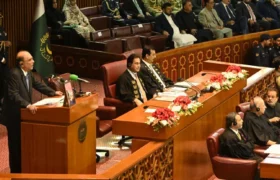The entire word right now is in partial or complete lockdown in order to contain the spread of the virus. Economies all over the world, including Pakistan, have come to a standstill. Pakistan economy, that has just started recovering from an external crisis, saw the country go back to International Monetary Fund (IMF) for another bailout. Success in containing the virus comes at a price of slow economic activity.
As the government, private businesses, civil society, and the public at large grapple with the emerging pandemic situation across the country, an important debate has evolved in many circles regarding the degree to which the scourge of coronavirus (Covid-19) might impact the Pakistani economy.
Jobs losses are in millions, particularly for semi-skilled and daily wage earners. Around 2.4% of the annual GDP has been lost due to COVID-19, which is enough to send the country into a spiraling recession.
At present, Pakistan is facing a unique and daunting challenge regarding its economy. It has to ensure that corona spread is controlled through aggressive steps such as lockdown and social distancing. However, at that same time, economy is slowing down and suffering due to lockdown.
Economic activities are crippled and have completely erased the stock market gains. Most of the exports orders had been cancelled and losses in terms of export revenue may be in the range of $2 billion to $4 billion. The estimated collection of revenue till June 2020 is just Rs 4.4 trillion as compared to the FBR’s annual target of 5.555 trillion resulting in massive revenue shortfall. The economy may face losses of $5 billion or even more.
The total external debt of Pakistan as of March 2019 is recorded at $105 billion, which is over 40% of the total debt added in the last 10 years. Whereas rupee currency is depleting drastically against dollar. Most of our debt is from the World Bank, IMF, Asian Development Bank, Paris Club, etc. Pakistan predominantly is dependent on import of the finished products and petroleum resources keeping our foreign reserves under constant pressure due to high fiscal and trade deficit.
The inflation rate in Pakistan has gone up to 12.93 which is highly alarming and it is a big indicator that there is going to be more price hike but the income slab of lower middle-class people will remain static. The main reason for inflation is the shortage of supply of regular items. In the wake of these crises, Pakistan’s initial economic losses incurred in different sectors of the country’s economy have been estimated at Rs1.3 trillion, on account of drop in the GDP growth.
Corona pandemic may have further aggravated the economic challenge but the solutions still lies in the old remedy. There is a requirement of more innate reforms to fix the economy. To make a significant impact on the current account deficit, Pakistan needs to ensure an investment-friendly environment that attracts more foreign direct investment (FDI), instead of relying so heavily on foreign aid. Pakistan’s economic crisis cannot be resolved overnight. Broadening tax base, encouraging innovation and modernization in export-led industries are some of the most urgent measures, the government can take to address the growing fiscal and current account deficit.




